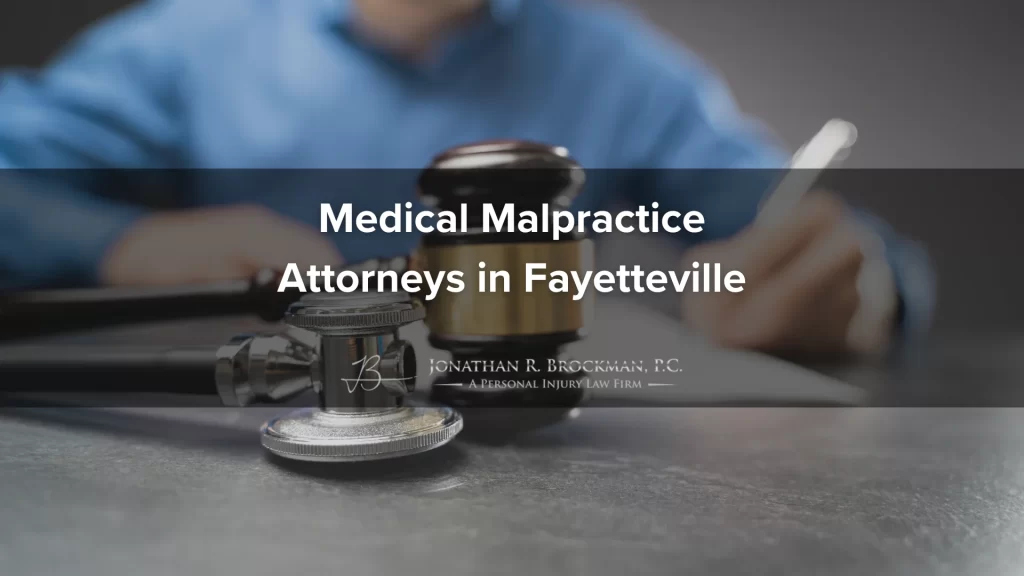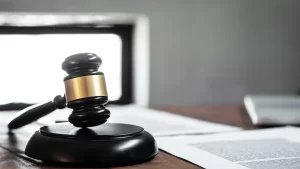
When you undergo a procedure or follow a medical professional’s advice, you assume you’ll be safe. It never crosses your mind that the doctor responsible for your health will make a mistake that could result in severe injuries. If you’ve faced the consequences of medical malpractice or errors, then you know how important it is to hold the at-fault parties responsible for your injuries.
Were you the victim of medical malpractice? Did you suffer injuries that required medical care? If so, you should contact Jonathan R. Brockman, P.C. for assistance with your case. We’ll help you fight for the maximum financial compensation possible and hold the negligent parties responsible.
Our Fayetteville medical malpractice lawyers understand how traumatic an experience like this can be. We’re prepared to take on your case and seek the settlement you deserve. Call us at 770-205-2231 today.
Types of Medical Malpractice Cases We Handle
- Misdiagnosis or failure to diagnosis
- Medication errors
- Defective medical devices
- Lack of appropriate pre- and post-care
- Inadequate sterilization of tools and equipment
- Surgical errors
- Incorrect reading of medical charts
- Failure to warn of potential side effects
Negligence Laws in Georgia
In Georgia, there are negligence laws that medical malpractice victims can use to pursue compensation in an insurance claim or lawsuit. The legal theory of negligence states that one party’s failure to exercise reasonable care to prevent another from harm becomes liable for the resulting injuries and damage.
There are five elements of negligence your attorney must show existed to prove liability in a medical malpractice case:
- Duty: The provider owed you a duty of care that a reasonable person would show under similar circumstances to prevent injuries;
- Breach of duty: They breached their duty of care;
- Cause in fact: If it wasn’t for their actions or inaction, you wouldn’t have sustained injuries;
- Proximate cause: Their actions and nothing else were the direct cause of your injuries; and
- Damages: You got hurt and incurred damages.
Medical staff must undergo thorough background checks and verification of education, training, and licensing. If a hospital or medical facility hires a doctor, nurse, or another provider that isn’t qualified, they could become legally liable for negligence.
In situations where the staff member is qualified but makes a mistake that causes an injury, the facility could still be held liable for hiring that person. Contact an attorney to discuss who might be liable for your injury.
How to Calculate Economic and Non-economic Damages
When someone’s negligence causes an injury, they cause damages in the form of medical care, the inability to work, and emotional suffering. There are two types of damages you can pursue in an insurance claim or lawsuit: economic and non-economic.
Economic damages are expenses, such as the cost of an ER visit or operation. In a medical malpractice case, you’re entitled to the following economic damages:
- Medical bills
- Property damage
- Lost income and future earnings
- Out of pocket expenses
Non-economic damages are physical and emotional losses endured because of medical errors. Examples include:
- Emotional distress
- Pain and suffering
- Disfigurement or disability
- Diminished quality of life
- Loss of consortium
It’s a challenge to place a monetary value on physical and emotional pain. To calculate a fair number, we’ll review the following contributing factors:
- Type of incident that led to the injury
- The severity of the injury
- Length of the recovery period
- If impairment or disability resulted
- Total economic damages associated with the incident
- Effect on the enjoyment of life
- Availability of evidence proving negligence
- Insurance coverage listed on the at-fault party’s policy
- Total lost wages from inability to work
- Type of medical treatment received
Typically, compensation is higher if the injury is severe, and there’s no question of liability. If you suffered something minor that only took a few weeks to recover from, you probably won’t receive a large insurance settlement.
Our Fayetteville medical malpractice lawyers understand the evidence necessary to maximize the value of your case. We’ll obtain every document associated with the incident to prove your injuries were the result of the provider’s negligence and how severe it was.
Seeking Punitive Damages in a Lawsuit
Many cases settle during an insurance claim, so injured victims can avoid going to court. It’s the easiest way to be compensated for economic and non-economic damages.
Sometimes there are some instances where a lawsuit is necessary. If we’re unable to negotiate a fair settlement with the insurance company, we’ll sue them and the at-fault party for the maximum financial award.
In Georgia, there’s a statute of limitations for medical malpractice cases. It’s a deadline you must follow if you want to pursue compensation in the civil court system. The statute of limitations is two years. That means you have two years from the injury date to sue the liable party.
If you weren’t aware of your injuries immediately after your medical procedure or symptoms don’t develop until years later, then your deadline might be different. When that happens, the injured party would have five years from the date the negligent act occurred to file a lawsuit. This is known as the statute of repose.
Economic and non-economic damages are available in both insurance claims and lawsuits. There’s a third type of damages you can only seek in a lawsuit. They’re called punitive damages.
Instead of compensating you for your economic and non-economic losses, punitive damages are a form of punishment against the at-fault party to deter similar misconduct.
Jury members don’t award punitive damages often. It’s only appropriate in very special circumstances. Your lawyer must be able to prove that the medical provider acted with fraud, malice, willful misconduct, oppression, wantonness, or a lack of regard for someone’s safety. Talk to your attorney to find out if punitive damages might be appropriate for your injury.
Can I File a Lawsuit If My Loved One Died from Medical Malpractice?
Yes. If medical malpractice caused your loved one’s death, you might be entitled to financial compensation for their damages. There are state laws you must follow to hold the negligent party accountable for their actions.
In Georgia, the definition of medical malpractice is the failure of one party to use reasonable care, which can result in death. If your loved one’s death was due to another party’s reckless, intentional, negligent, or criminal acts, you could file a lawsuit.
The statute of limitations is two years. The clock begins on the date the deceased died. Some situations can pause the clock. They include the following:
- The clock can pause for up to five years if the deceased victim’s estate isn’t probated.
- The clock can pause if there’s a pending criminal case for events similar to your lawsuit and will start when it’s resolved.
Only a handful of people are eligible to recover compensation from a wrongful death claim. Since the victim can’t pursue their own legal action against the negligent party, a surviving family member or personal representative of their estate must.
The following parties are allowed to file a wrongful death claim, in ranked order:
- Surviving spouse (with the interests of their minor children)
- Surviving adult children
- Surviving parent or parents
- A personal representative of the estate
There are two types of damages in wrongful death cases. The first is meant to place value on the deceased’s life. The monetary damages associated with their financial and intangible losses include:
- Loss of care, companionship, and other benefits the deceased provided to their loved ones
- Lost wages and benefits, including any the deceased would have made if they lived an average lifetime
The second type is supposed to compensate for the deceased’s expenses and any suffering they experienced because of the fatal injury. It includes the following:
- Medical costs associated with fatal injury or illness
- Burial and funeral expenses
- Pain and suffering endured before death
Jonathan R. Brockman, P.C. Fees and Costs
 Some medical malpractice victims try to handle their case alone because they worry about the cost of legal representation. Unfortunately, that decision almost always backfires. They often lose their case or settle for a number much lower than they deserve.
Some medical malpractice victims try to handle their case alone because they worry about the cost of legal representation. Unfortunately, that decision almost always backfires. They often lose their case or settle for a number much lower than they deserve.
Our Fayetteville medical malpractice lawyers understand the financial struggles you faced due to your injuries. We don’t want to add to your burden, which is why we take cases on a contingency fee basis.
That means we don’t expect upfront payment from our clients. We don’t collect our legal fees unless we recover financial compensation from the negligent party. If we lose your case, you don’t have to pay us.
We also schedule initial consultations with prospective clients for free. If you want free legal advice, we’re happy to give it to you. We’ll meet with you to review the details of your case and advise you of the legal options available.
Speak to an Experienced Fayetteville Medical Malpractice Lawyer
At Jonathan R. Brockman, P.C., our team of personal injury lawyers cares about our clients. We’ll take the time to get to know you to create an effective plan that meets your individual needs.
You’ll always feel like a priority while we’re working on your case. We believe in open and honest communication, no matter what. If you suffered injuries due to medical malpractice and need help with the next steps, call us today at 770-205-2231.
